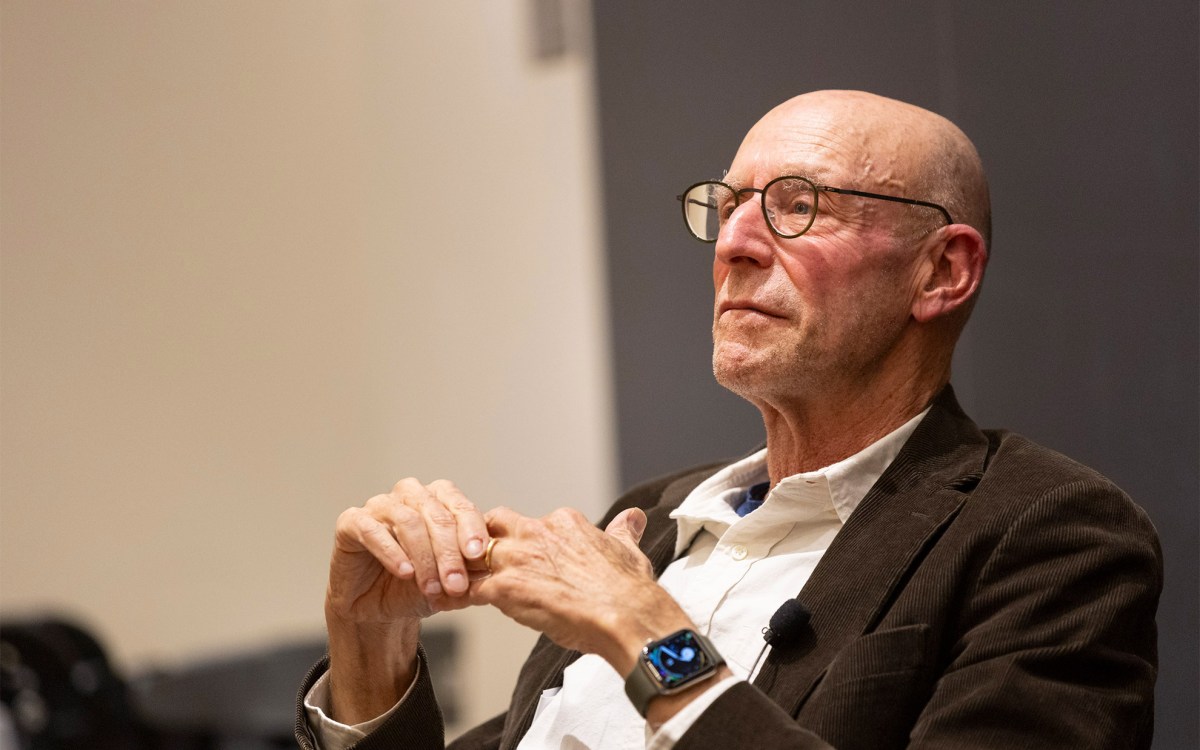Health
-

Yoga can help cut severe, initial opioid-withdrawal period in half, study finds
Researchers say results could dramatically increase chances of recovery
-

6 keys to a long, healthy life (ice cream included)
Also, why reading Ben Franklin beats climbing Mount Everest
-

Six cancers rising faster in younger adults than older ones
Large new global study fuels growing concern over trend of increases in several types

-

What’s next for GLP-1s?
Scientists eye new treatment targets for popular weight-loss drugs, from heart failure to addiction
-

Drinking 2-3 cups of coffee a day tied to lower dementia risk
Caffeinated tea also found to slow cognitive decline in study

-

New AI tool predicts brain age, dementia risk, cancer survival
Unlike other AI models, BrainIAC needs limited data to ID key neurological health indicators

-
Microbes thrive in harsh, isolated water under Antarctic glacier
A reservoir of briny liquid buried deep beneath an Antarctic glacier supports hardy microbes that have lived in isolation for millions of years, researchers report this week in the journal…
-
Breast cancer danger rising in developing world
Women in developing nations, once thought to have a small chance of contracting breast cancer, are increasingly getting the disease as lifestyles incorporate risk factors common in industrialized nations, panelists at the Harvard School of Public Health (HSPH) said Tuesday (April 14).
-
Study links steroid abuse to key biological, psychological characteristics
A study by researchers at Harvard-affiliated McLean Hospital sheds new light on anabolic steroid users, augmenting previous research suggesting that users can become dependent on the drugs and showing for…
-
Long-lasting nerve block could change pain management
Harvard researchers at Children’s Hospital Boston have developed a slow-release anesthetic drug-delivery system that could potentially revolutionize treatment of pain during and after surgery, and may also have a large impact on chronic pain management.
-
For cancer cells, genetics alone is poor indicator for drug response
In certain respects, cells are less like machines and more like people. True, they have lots of components, but they also have lots of personality. For example, when specific groups…
-
Harvard surgeons perform second partial face transplant in U.S.
Surgeons at Harvard-affiliated Brigham and Women’s Hospital toiled for 17 hours in twin operating rooms yesterday performing the second facial transplant surgery operation in the U.S. The complex, challenging operation,…
-
Study shows waist size predictor of heart failure in men and women
Adding to the growing evidence that a person’s waist size is an important indicator of heart health, a study led by investigators at Beth Israel Deaconess Medical Center (BIDMC) has found that larger waist circumference is associated with increased risk of heart failure in middle-aged and older populations of men and women.
-
Waist size predictor of heart failure in men and women
Adding to the growing evidence that a person’s waist size is an important indicator of heart health, a study led by investigators at Beth Israel Deaconess Medical Center (BIDMC) has found that larger waist circumference is associated with increased risk of heart failure in middle-aged and older populations of men and women.
-
Mexican program successful at reducing crippling health care costs
Seguro Popular, a Mexican health care program instituted in 2003, has already reduced crippling health care costs among poorer households, according to an evaluation conducted by researchers at Harvard University in collaboration with researchers in Mexico.
-
Simple bedside test improves diagnosis of chronic back pain
A simple and inexpensive method of assessing pain, developed by Harvard researchers at Massachusetts General Hospital (MGH), is better than currently used techniques for distinguishing neuropathic pain – pain caused…
-
Lighting up Parkinson’s disease research
Most people do not think of jellyfish at the mention of Parkinson’s disease research. But, at the MassGeneral Institute for Neurodegenerative Disease (MIND), researchers Pamela McLean and Bradley Hyman are…
-
Skin biology illuminates how stem cells operate
As a girl, Elaine Fuchs borrowed her mother’s old strainers and mixing bowls to collect polliwogs, an activity she credits for her present-day career as a biologist.
-
Urban areas offer hidden biodiversity
Urban areas around the world are places of hidden biodiversity that need to be protected and encouraged through smart urban design, said an authority in green city design.
-
Study: Key to happiness is listen to others
Want to know what will make you happy? Then ask a total stranger — or so says a new study from Harvard University, which shows that another person’s experience is often more informative than your own best guess.
-
Development of ‘the pill’ examined
The birth control pill, which revolutionized contraception and sparked a cultural reassessment of the purpose of sex and the sanctity of life, was developed by a Harvard fertility doctor who believed people should have children early in life — and as many as they could afford.
-
Five named Early Career Scientists
Five Harvard researchers are among 50 young scientists nationwide who will have their work supported for the next six years by a new initiative from the Howard Hughes Medical Institute (HHMI).
-
How stem cells find their way around
Harvard Stem Cell Institute (HSCI) researchers have for the first time identified in mice a cellular mechanism that directs stem cells to their ultimate destination in the body.
-
Beth Israel Deaconess Medical Center among top 100 hospitals
Beth Israel Deaconess Medical Center (BIDMC), an affiliate of Harvard Medical School, has been named one of the top 100 hospitals in the United States. The award is based in overall organizational performance, according to the annual study released Monday (March 30) by the health care business of Thomson Reuters. BIDMC was the only Massachusetts hospital named in the survey.
-
Modification of mutant Huntington’s protein increases its clearance from brain cells
A new study has identified a potential strategy for removing the abnormal protein that causes Huntington’s disease (HD) from brain cells, which could slow the progression of the devastating neurological…
-
A mother’s criticism touches nerve in formerly depressed
Formerly depressed women show patterns of brain activity when they are criticized by their mothers that are distinctly different from the patterns shown by never-depressed controls, according to a new…
-
Infant weight gain linked to childhood obesity
As childhood obesity continues its 30-year advance from occasional curiosity to cultural epidemic, health care providers are struggling to find out why — and the reasons are many. Increasingly sedentary…
-
Angiogenesis inhibitor improves brain tumor survival by reducing swelling
The beneficial effects of anti-angiogenesis drugs in the treatment of the deadly brain tumors called glioblastomas appear to result primarily from reduction of edema – the swelling of brain tissue…
-
Newly identified genetic variants found to increase breast cancer risk
A large-scale effort to identify genetic markers of breast cancer has uncovered two common genetic variants that increase risk of the disease in women of European ancestry. The paper, published…
-
U.S. hospitals slow to adopt electronic health records, citing cost
There is broad consensus that electronic health records (EHR) have the potential to improve the efficiency and effectiveness of health care providers. Yet, to date, there has been no reliable…
-
Mechanism directing stem cells to their destination identified;
Harvard Stem Cell Institute (HSCI) researchers have for the first time identified in mice a cellular mechanism that directs stem cells to their ultimate destination in the body. The finding…
-
President Obama taps Howard Koh for Assistant Secretary for Health
President Barack Obama announced today his intent to nominate Howard Koh, the Harvey V. Fineberg Professor of the Practice of Public Health at Harvard School of Public Health (HSPH), to…
-
Hearing could hold key to unlocking schizophrenia mystery
Measuring brain waves in response to hearing a variety of tones appears to be a useful way to begin understanding the underlying genetic abnormalities associated with schizophrenia, says a study…
-
Blumenthal named national coordinator for health information technology
The U.S. Department of Health and Human Services (HHS) announced today (March 20) the selection of David Blumenthal as the Obama administration’s choice for national coordinator for health information technology. …
-
Study IDs human genes required for hepatitis C viral replicating
Massachusetts General Hospital (MGH) researchers are investigating a new way to block reproduction of the hepatitis C virus (HCV) — targeting not the virus itself but the human genes the virus exploits in its life cycle. In the March 19 Cell Host & Microbe, they report finding nearly 100 genes that support the replication of HCV and show that blocking several of them can suppress viral replication in cultured cells.
-
Training the talent in trouble spots
The Harvard Initiative for Global Health (HIGH) has begun a fellowship program with the aim of identifying and helping train bright young developing-world health professionals in remote regions of the world with the greatest global health challenges.


